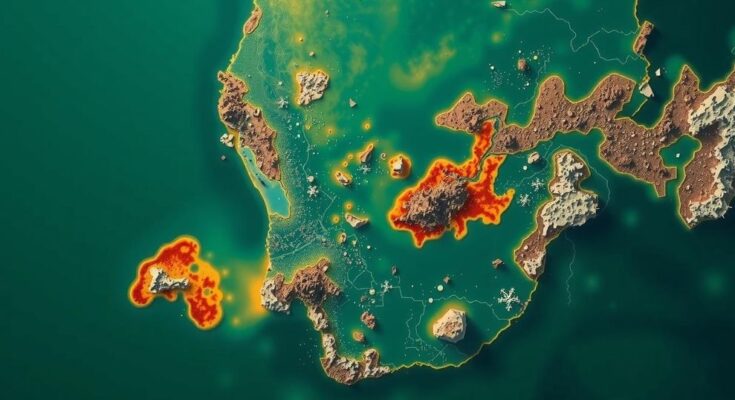A recent study highlights severe contamination of African waters by PFAS, known as ‘forever chemicals.’ Found in 11 countries, these substances pose serious health risks and threaten aquatic ecosystems. Key hotspots, including the Vaal River and Lake Victoria, are primarily affected by industrial discharge and outdated wastewater treatment methods. Strengthened regulations, public education, and advanced technological solutions are essential to combat this growing environmental concern.
Recent findings have revealed alarming levels of perfluoroalkyl and polyfluoroalkyl substances (PFAS), commonly referred to as “forever chemicals,” in various water bodies across Africa, including Lake Victoria and the Vaal River in South Africa. These chemicals pose severe environmental risks as they do not degrade easily and accumulate in both ecosystems and the human body. A study conducted by researchers Patrick Ssebugere, Ashirafu Miiro, and Oghenekaro Nelson Odume highlighted that PFAS contamination is prevalent in at least 11 African nations, and regulatory measures to control their use are currently inadequate.
The study has identified South Africa, Kenya, Nigeria, Uganda, Ghana, Ethiopia, Mozambique, Tanzania, Zambia, Mali, and Tunisia as nations where PFAS contamination has been reported. The researchers noted that South Africa exhibited some of the highest levels of these substances. Urbanization, outdated wastewater treatment technologies, and industrial activities were pinpointed as significant contributors to this pollution. Key hotspots include the Vaal River and the Nairobi River, with Lake Victoria facing severe contamination risks due to its ecological and sociocultural significance.
PFAS have detrimental effects, including the disruption of aquatic biodiversity, which can lead to significant ecological imbalance. They also pose health risks to humans, potentially leading to critical health issues such as kidney disease and reproductive disorders. To combat PFAS pollution, several strategies have been proposed, including stricter regulatory frameworks that align with international agreements, improved wastewater treatment technologies, and increased public awareness regarding the hazards these chemicals present.
Ultimately, addressing PFAS contamination not only requires immediate attention to existing environmental policies and effective implementation but also substantial public engagement and scientific research to develop solutions that are suitable for African contexts.
The issue of PFAS pollution represents an urgent environmental crisis, especially in developing countries where industrial and agricultural practices are often unregulated. The persistent nature of these chemicals in the environment poses a significant threat to both biodiversity and human health. As they accumulate in food chains, the potential for hazardous exposure increases, leading to various health dilemmas. Understanding the context and significance of this pollution is crucial in highlighting the need for improved regulatory measures and technological advancements in water treatment.
The presence of PFAS, or “forever chemicals,” in African waters is a pressing environmental issue that necessitates immediate action. Regulatory frameworks must be strengthened to hold industries accountable for pollution, and there is an urgent need to enhance wastewater treatment facilities. Increased public awareness and further research are essential to effectively manage and mitigate the risks associated with these hazardous chemicals.
Original Source: theconversation.com




